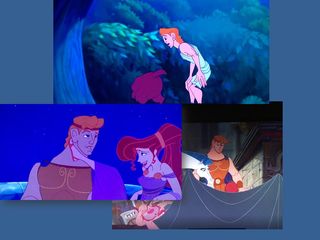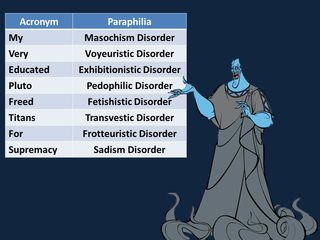
Psychiatry
Disney Plus Dream Job: Hercules
Viewing Disney's Hercules through a psychiatrist's lens
Posted December 10, 2019
Introduction
Faculty, residents, and students at my university are participating in the Disney Plus Dream Job and watching 30 Disney films in 30 days. Welcome to our Day #12 blog post! Course directors successfully incorporated the 30 films (and shows) into our preexisting curriculum that teaches psychiatry to future physicians through film and other aspects of popular culture. Views Through the Psychiatrist’s Lens will publish daily blogs throughout the 30-day Disney Plus Dream Job. Our twelfth blog is on the 1997 film, Hercules.
Synopsis
Hercules is a 1997 animated film produced by Walt Disney Pictures. The film is loosely based on the legendary hero of mythology and incorporates aspects of Greek and Roman culture (he goes by his Roman name, Hercules; the son of Zeus, the Greek god of the sky). The loose associations trickle down to the details of the film as well, incorporating heroes, monsters (and even a winged colt) from other myths.
At the time of this posting, the film holds a rating of 7.3 out of 10 on IMDb and a tomatometer rating of 84% on Rotten Tomatoes.
How it relates to the field of psychiatry
Hercules (1997) quickly departs from Greek myth literally at its conception. Hercules was the son of Zeus, king of the gods, and Alcmene, a mortal woman. Hera (Zeus’s wife) was not his loving mother as depicted in the film (1). On the contrary, she cast a spell on him that drove him temporarily psychotic and caused him to murder his wife, Megara, and their two children. Overcome with guilt, Hercules became depressed and contemplated suicide. He instead consulted a psychiatrist the Oracle at Delphi who told him he must attach himself to King Eurystheus of Tiryns who would devise 12 labors to atone for his sins (2). This part of the myth depicts an Adjustment Disorder that due to suicidal thoughts formulates as a severe Major Depressive Episode. To the extent that his profound guilt is alleviated by the twelve steps for him by the king, a co-occurring substance use disorder must also be considered. Whether the role of the substance included the “spell” cast upon him by Hera or was a later manifestation (e.g. self-medicating) is unclear. One thing is certain: this analysis of Hercules frames the myth as a case study of recovery and resiliency. Accordingly, the Greek name ‘Herakles’ means “Glory of Hera,” signifying that he would become famous through his difficulties with overcoming his mental illness the goddess.
Another perspective of the psychology of Hercules focuses on the origin of Hera’s wrath. Hercules was born of rape (as were hundreds of Zeus’ children). Was Zeus afflicted with sex addiction? While Compulsive Sexual Behavior Disorder was added to the World Health Organization’s International Classification of Diseases, it is not currently recognized by the American Psychiatric Association (DSM-5). For now, we’ll leave this provisional diagnosis up for debate.
Compulsive Sexual Behavior Disorder prompts discussion of other sexual disorders highlighted in the film. The paraphilic disorders (DSM-5, p. 685-705) are a group of disorders defined through clinically significant sexual deviations. Three deserve special mention (Figure 1).
Starting at "12:00" and moving clockwise, we are first introduced to Phil at 00:25:04 as he is looking at nymphs while they are bathing. Voyeuristic Disorder is a condition defined as recurrent and intense sexual arousal from observing unsuspecting nymphs people who are naked, in the process of disrobing, or engaging in sexual activity.

Upon arriving in Thebes at 00:39:50, a merchant exposes himself to an unsuspecting Hercules. Exhibitionist Disorder is defined as recurrent and intense sexual arousal from the exposure of one’s sundials genitals to an unsuspecting person.
At 00:58:38, Megara tries to seduce Hercules by bringing attention to “weak ankles’ and rubbing them on his face. Fetishistic Disorder is defined through recurrent and intense sexual arousal from a “highly specific focus on nongenital body parts” (e.g. feet).
Hercules provides a platform to discuss several sexual deviancies that are often difficult to discuss and address in academic medicine. Additionally, the film also allows for learning and remembering the various sexual disorders that make up the Paraphilic Disorder chapter of the DSM-5. While many have learned the planets (named for Roman Gods) of the milky way via the acronym (or some variation of) My Very Educated Mother Just Sent Us Nine Pizzas, so too can Greek myth provide a way to name the eight Paraphilic Disorders (Table 1). Here, we choose Hades’s Roman name (Pluto).


